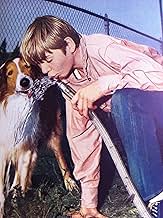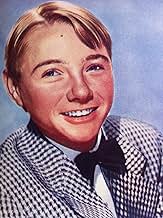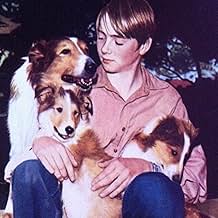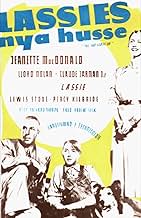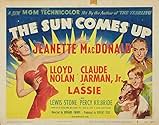Ajouter une intrigue dans votre langueSet in the rural south of the United States, a bereaved war widow learns to to put aside her bitterness and grief as she grows to love a young orphan boy and the dog that belonged to her lat... Tout lireSet in the rural south of the United States, a bereaved war widow learns to to put aside her bitterness and grief as she grows to love a young orphan boy and the dog that belonged to her late son. Punctuated with song-filled interludes.Set in the rural south of the United States, a bereaved war widow learns to to put aside her bitterness and grief as she grows to love a young orphan boy and the dog that belonged to her late son. Punctuated with song-filled interludes.
- Réalisation
- Scénario
- Casting principal
Ed Agresti
- Musician
- (non crédité)
Jessie Arnold
- Townswoman at Fire
- (non crédité)
Charles Bates
- Orphan
- (non crédité)
Bobby Beyers
- Orphan
- (non crédité)
Barbara Billingsley
- Nurse
- (non crédité)
Paul E. Burns
- Dr. Sample
- (non crédité)
John Butler
- Hotel Attendant
- (non crédité)
Avis à la une
This film was Jeanette MacDonald's last film. And, considering it's a nice little family movie, she went out in style.
Helen is distraught. Her son has just died and she has decided to retreat to the countryside to try to forget. This is made tougher because the boy's dog refuses to leave her and she reluctantly takes the dog along with her. Through the course of the movie, Helen becomes friends with an orphan boy, Jerry (Claude Jarmin Jr.) and the woman who wants to be alone and forget soon learns to live again.
This film is less a Lassie film than most. Sure, the dog's important to the story...but the humans are more important and he's more a supporting player. Overall, very engaging and a nice story that you are sure to enjoy....and made with the usual MGM style and flair.
Helen is distraught. Her son has just died and she has decided to retreat to the countryside to try to forget. This is made tougher because the boy's dog refuses to leave her and she reluctantly takes the dog along with her. Through the course of the movie, Helen becomes friends with an orphan boy, Jerry (Claude Jarmin Jr.) and the woman who wants to be alone and forget soon learns to live again.
This film is less a Lassie film than most. Sure, the dog's important to the story...but the humans are more important and he's more a supporting player. Overall, very engaging and a nice story that you are sure to enjoy....and made with the usual MGM style and flair.
Jeanette MacDonald stars as a widowed concert singer who suffers another disaster and yearns to retire from the world. She loads up her nifty wood-paneled convertible (a Plymouth?) and dog (Lassie) and sets out. She finds a house in the mountains of a small Southern town and settles in. But she's never runs a household before and discovers she must do her own household chores, cooking, etc. This puts her into contact with the comical-but-wise town grocer (Percy Kilbride) and some other locals. Most annoying, however, is the boy Kilbride has sent to do chores. The boy and dog instantly bond. Slowly, MacDonald gets back her hold on her life, learns to love the boy (Claude Jarman) and return to her own world. But she'll never be the same.
Full of funny moments and a few that will tug your heart strings, this is a nice old-fashioned film and well done by all involved. The Technicolor is also beautiful.
MacDonald, in her final film appearance, looks great and turns in a terrific performance as the woman who learns to love again. She also sings a few songs, including a beautiful rendition of "Un Bel di Vedremo" from MADAMA BUTTERFLY. Kilbride is hilarious as is Margaret Hamilton as the nosy spinster. Jarman is solid in a role that could have been cloying. Others include Lloyd Nolan, Lewis Stone, Ida Moore, Dwayne Hickman, Hope Landin, and Barbara Billingsley.
What a shame the great MacDonald never found another film vehicle. Voice aside, she was a marvelous actress with a great sense of comic timing. Her final film doesn't rank with her unforgettable films with Nelson Eddy, but it's a fine and memorable film in its own right.
Full of funny moments and a few that will tug your heart strings, this is a nice old-fashioned film and well done by all involved. The Technicolor is also beautiful.
MacDonald, in her final film appearance, looks great and turns in a terrific performance as the woman who learns to love again. She also sings a few songs, including a beautiful rendition of "Un Bel di Vedremo" from MADAMA BUTTERFLY. Kilbride is hilarious as is Margaret Hamilton as the nosy spinster. Jarman is solid in a role that could have been cloying. Others include Lloyd Nolan, Lewis Stone, Ida Moore, Dwayne Hickman, Hope Landin, and Barbara Billingsley.
What a shame the great MacDonald never found another film vehicle. Voice aside, she was a marvelous actress with a great sense of comic timing. Her final film doesn't rank with her unforgettable films with Nelson Eddy, but it's a fine and memorable film in its own right.
Nice, simple family film, a bit dated but still with enough charm and humor to make it agreeable--based on a novel by Marjorie Kinnan Rawlings, author of 'The Yearling'. Jeanette has her bitterness melted by Claude Jarman, Jr. and Lassie when she decides to retreat to the country to forget about the death of her son. An above-average Lassie film with a rather predictable ending after a tense fire sequence in which he rescues Claude Jarman, Jr. from a burning loft. A few nice songs by Jeanette, beautiful settings and some amusing performances by Percy Kilbride, Margaret Hamilton and others. Lloyd Nolan turns up for a cameo role. Pleasant entertainment. The blurb on the VHS copy I have cites a quote from the N.Y. Times which is so accurate: "Simple and sweet...Jeanette MacDonald has never looked lovelier."
This is a movie that may be a bit corny by modern measure but a wonderful film to sit down with a young child and watch. Old time values--a slice of life with real problems---a happy ending.
Though she didn't intend The Sun Comes Up to be her final film, it turned out that way for Jeanette MacDonald. In this movie she plays, what else, a concert singer who is a war widow. After a few years of devoting herself to raising her only son, Dwayne Hickman, MacDonald is encouraged by her manager Lewis Stone to go back to the concert stage.
She goes back and becomes a great success in her comeback. But after the concert she sees her son run down by a truck as he was trying to save their collie Lassie from the same fate.
That just about destroys her and who could blame her for wanting to get away from it all. She rents an unused house deep in the Appalachians in North Carolina that's owned by Lloyd Nolan. She and Lassie go to live there and get involved with a group of kids from the county orphanage. Especially one young man, Claude Jarman, Jr., who reminds her of her late son.
Jeanette gets some good opera and concert material to sing, items that were staples in her real concerts. The highlights for me are Un Bel Di from Madame Butterfly and Romance.
And she gets her most cooperative co-star ever in Lassie. The beloved collie pulls off quite a rescue in the climax, but didn't steal any scenes from Jeanette MacDonald.
She never planned that The Sun Comes Up would be her last film. She had a lot of ambitions to return to the screen. During the Fifties she did The King and I in summer stock and hoped to be cast in the film adaption as Anna Leonowens. I think the part would have suited her perfectly and she wouldn't have to have been dubbed as Deborah Kerr was.
And one part she really wanted was as the Mother Abbess in The Sound of Music. She loved the song Climb Every Mountain. But by the time the film version of Sound of Music was being cast, Jeanette's health was failing.
Still The Sun Comes Up is a fine family film and a fitting end for a screen legend.
She goes back and becomes a great success in her comeback. But after the concert she sees her son run down by a truck as he was trying to save their collie Lassie from the same fate.
That just about destroys her and who could blame her for wanting to get away from it all. She rents an unused house deep in the Appalachians in North Carolina that's owned by Lloyd Nolan. She and Lassie go to live there and get involved with a group of kids from the county orphanage. Especially one young man, Claude Jarman, Jr., who reminds her of her late son.
Jeanette gets some good opera and concert material to sing, items that were staples in her real concerts. The highlights for me are Un Bel Di from Madame Butterfly and Romance.
And she gets her most cooperative co-star ever in Lassie. The beloved collie pulls off quite a rescue in the climax, but didn't steal any scenes from Jeanette MacDonald.
She never planned that The Sun Comes Up would be her last film. She had a lot of ambitions to return to the screen. During the Fifties she did The King and I in summer stock and hoped to be cast in the film adaption as Anna Leonowens. I think the part would have suited her perfectly and she wouldn't have to have been dubbed as Deborah Kerr was.
And one part she really wanted was as the Mother Abbess in The Sound of Music. She loved the song Climb Every Mountain. But by the time the film version of Sound of Music was being cast, Jeanette's health was failing.
Still The Sun Comes Up is a fine family film and a fitting end for a screen legend.
Le saviez-vous
- AnecdotesThe Sun Comes Up (1949) is mainly based on the 1936 short story "A Mother in Mannville" by Marjorie Kinnan Rawlings. According to the University of South Carolina Libraries description of Rawlings' works, in 1946 MGM asked Rawlings to do a story that could star Lassie with Claude Jarman Jr.. Rawlings started with her 1936 short story "A Mother in Mannville." MGM bought the rights to Rawlings' unpublished story "A Family for Jock," re-titled it "Mountain Prelude," and sold the literary rights to The Saturday Evening Post. The story appeared The Post as a six-part serial during April 26 to May 31, 1947. But it has never been published in novel form.
- GaffesWhen Jerry finally decides to go play with Lassie, we can hear someone off-screen give Lassie a command. Right after Jerry says,"Let's have fun now," and hugs Lassie, a man's voice clearly speaks a word off-camera, and Lassie looks in that direction before running off with the boy.
- Bandes originalesUn Bel Di
(uncredited)
from "Madama Butterfly"
Music by Giacomo Puccini
Libretto by Luigi Illica and Giuseppe Giacosa
Sung by Jeanette MacDonald
Meilleurs choix
Connectez-vous pour évaluer et suivre la liste de favoris afin de recevoir des recommandations personnalisées
Détails
- Durée
- 1h 33min(93 min)
- Rapport de forme
- 1.37 : 1
Contribuer à cette page
Suggérer une modification ou ajouter du contenu manquant


